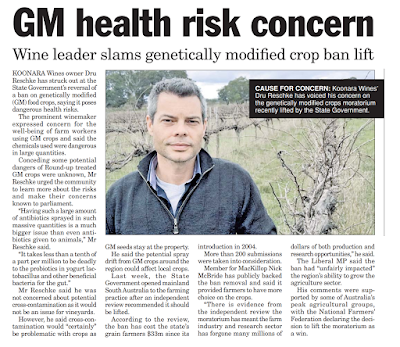When Community Leaders (and News Media) Get it Wrong
It always bothers me when prominent community figures or celebs push rhetoric designed to deny farmers access to technology. I'm visiting Adelaide, Australia and was amazed to see a local paper run a story about a local wine maker that "slams" a likely change in farmer seed choice.
GE crops are perfectly allowable in Australia, but the state governments of South Australia and Tasmania have imposed restrictions that block their use. Recent changes in policy suggest that these rules are likely to change.
But news reports show that at least one local business leader is ramping up the rhetoric to skew public perception. That's fine on the surface. We should have honest, science-based discussions. The problem is that he gets the science wrong, the debate is asymmetrical, and it scares the public and disparages farmers that simply want the right to choose the technology whey wish to use.
This article ran in South Australia: (click panels to enbiggen)
GE crops are perfectly allowable in Australia, but the state governments of South Australia and Tasmania have imposed restrictions that block their use. Recent changes in policy suggest that these rules are likely to change.
But news reports show that at least one local business leader is ramping up the rhetoric to skew public perception. That's fine on the surface. We should have honest, science-based discussions. The problem is that he gets the science wrong, the debate is asymmetrical, and it scares the public and disparages farmers that simply want the right to choose the technology whey wish to use.
This article ran in South Australia: (click panels to enbiggen)
It is disturbing when leaders in commerce make ill-informed statements that harm others' freedom to operate.
Let's look at this article line by line-
The take-home message of this analysis is:
While the inflammatory headline indicates potential issues with health, there is no evidence of that presented and it is barely mentioned in the article. However, to the casual headline-only reader it suggests that the article contains evidence of substantiate the claim.
Dru Reschke should be very careful about the glass house he operates in. Criticizing farmers for their safe choices that do not negatively impact human health, as someone who manufactures a product with known roles in negatively impacting human health is a dangerous and hypocritical position to take. I would defend his right to follow his passions and pursue legal business choices just as I do farmers, but he needs to understand the optics of his bravado. He manufactures a Class 1 carcinogen that if used as directed causes health problems and accidents.
Mr. Reschke and the reporter communicating the story know little about glyphosate-based chemicals, and clearly there is evidence that little is understood about how any grape crop is treated or protected from the many threats that impede production. Grapes require chemistry to survive, conventional or organic.
Headlines and articles like this are deceptive, incorrect, and misinform. To maintain relevance the news media needs to consult experts in these subject areas before publishing false and misleading information that harms trust in farming.







